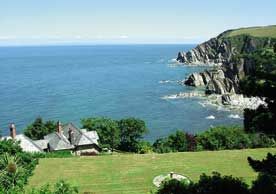Confusion over coastal path properties for sale
Uncertainty over the future of the proposed coastal path around England is affecting sales, and prices, of properties situated along its route


What runs but never moves? A path. Also a riddle is what is to become of the coastal-access path. Reports of its demise may be premature, but it may need life support. Will it get it and does it deserve it?
The ambition to build a path around England was included in the Marine and Coastal Access Act passed in the dying months of the Labour government. It would fill in gaps between existing paths, covering about a third of England's coastline, according to Natural England.
‘This figure ignores parts of existing access routes, public rights of way, and many other ways in which people are entitled to walk along the coast,' counters CLA Deputy President Harry Cotterell. ‘All but 16% of the coast is accessible, and half of this will remain inaccessible because of military bases, ports, conservation sites and so on. The last Government pledged £50 million to secure access to a mere 8% of the coast, which in a time of financial difficulty is ridiculous.'
The NFU's Andrea Graham describes that budget as ‘woefully inadequate. A job half done that ends up poorly resourced could leave our members picking up the bill for on-going maintenance. The economic climate reinforces our call for quality rather than quantity of access'.
Some walkers have called for any expenditure to be directed at improving existing facilities-‘loos and tea rooms, not more paths,' as one put it. But others are more gung-ho. ‘During these times of austerity, it's more important than ever that the Government maintains its commitment to funding and creating the path,' declares Kate Ashbrook, General Secretary of the Open Spaces Society and a trustee of the Ramblers. But many question whether the Government has the money.
The Daily Telegraph and The Times ran stories saying the idea had been shelved indefinitely. Natural England has denied this, although it admitted the path would no longer be delivered within the announced 10-year period. In a statement it said: ‘Work at the Weymouth stretch of the path is continuing, but the five local authorities involved in the implementation of the first phase of the All England Coastal Path have been informed that the scale and scope of the initial rollout in their areas will need to be reduced.'
Indeed, in the Financial Times, Jim Pickard wrote: ‘I asked a former (Labour) Defra minister what the easiest cut in his old department would be. The ans-wer: the new coastal path.' Before the election, Lord Greaves, the then spokesman on Defra matters for the Liberal Democrats, said: ‘While we were passing the bill through Parliament, the Conservatives sometimes seemed lukewarm in their support for this part of it. A government looking for cuts may find this to be an easy option.'
Sign up for the Country Life Newsletter
Exquisite houses, the beauty of Nature, and how to get the most from your life, straight to your inbox.
The Act commits the Government to working towards establishing a path, but doesn't say how hard it has to work, nor when the work should be completed. There are echoes of Yes Minister in Defra's statement: ‘Ministers are committed to implementing the coastal access provisions in the Act. But Mini-sters will have their own views on where the priority areas will be to boost coastal economies through tourism. We are working to assess which areas of spending can deliver savings.'
‘Any delay will be welcomed by many of our members,' adds Miss Graham. ‘However, as long as the Act remains on the statute book, it could simply extend the period of uncertainty for them regarding the impact on their businesses.' ‘This will be no ordinary footpath, the kind people walk along and do not much else on,' points out Martin Lamb, head of the Exeter office of Savills.
‘This one will have "spreading room", so people will be able to picnic on it and goodness knows what else on the land. If the path was definitely coming and people knew what, where and when, they could plan for it. But as no one knows what may happen, house sales and prices in affected areas are depressed as a result.'
The CLA's President, William Worsley, is equally concerned. ‘Every coastal homeowner, farmer and business will have their land blighted. No one can make long-term plans for their land when the right of public access is looming. Business planning is impossible.' Matters may become clearer when Defra announces its 2011 to 2015 budget on October 20.
Country Life is unlike any other magazine: the only glossy weekly on the newsstand and the only magazine that has been guest-edited by HRH The King not once, but twice. It is a celebration of modern rural life and all its diverse joys and pleasures — that was first published in Queen Victoria's Diamond Jubilee year. Our eclectic mixture of witty and informative content — from the most up-to-date property news and commentary and a coveted glimpse inside some of the UK's best houses and gardens, to gardening, the arts and interior design, written by experts in their field — still cannot be found in print or online, anywhere else.
-
 A well-connected rural playground with 23 acres on the edge of the South Downs National Park
A well-connected rural playground with 23 acres on the edge of the South Downs National ParkOld House Farm is an impressive family home with a wealth of amenities that would inspire any rural passion.
By Arabella Youens Published
-
 The UK gets its first ‘European stork village’ — and it's in West Sussex
The UK gets its first ‘European stork village’ — and it's in West SussexAlthough the mortality rate among white storks can be up to 90%, the future looks rosy for breeding pairs in southern England.
By Rosie Paterson Published

